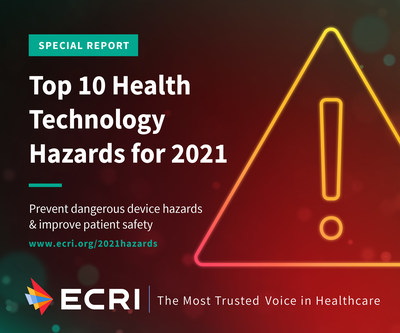Subject: NPT
Safety Leader Lists Provider Management of Medical Devices with COVID-19 Emergency Use Authorization a Top Hazard for 2021
PLYMOUTH MEETING, Pa., Jan. 28, 2021 /PRNewswire/ -- Hundreds of medical products have been authorized for temporary use in the past year to meet the unprecedented need for life-saving equipment and supplies during the COVID-19 pandemic. Today, an internationally respected patient safety organization cautions that meticulous management of these Emergency Use Authorization (EUA) products is crucial to protecting patients, healthcare workers, and hospital operations.
ECRI, an independent nonprofit organization, listed the complexity of managing devices that have been authorized through the EUA process at the top of its just-released 2021 Top 10 Health Technology Hazards report.
"Emergency Use Authorization is a lower standard than is used to assess safety and effectiveness through FDA's normal clearance process, and it requires more work on the part of the hospital," says Marcus Schabacker, MD, PhD, president and Chief Executive Officer of ECRI.
Through its EUA process, FDA can green-light previously unapproved products?or new indications for previously cleared products?as acceptable for use during an emergency. Hospitals need to watch for safety and performance issues, monitor the device's authorization status daily, and know what to do with the device when the EUA ends.
"Failing to do so could create safety risks for patients and liability risks for the hospital," adds Schabacker, because once the EUA designation ends, the legal protections that support the use of EUA devices on new patients vanish.
EUAs can be ended at any time. For example, in August 2020, FDA revoked the EUA for a class of protective barrier enclosures after they were found to increase healthcare workers' exposure to airborne particles, rather than limiting exposure.
"We're concerned that hospitals might not have adequate processes in place to deal with this complex challenge," says Schabacker. "Our new guidance can act as a roadmap for hospitals and health systems broadly. Additionally, through our alerts tracking reports, we are providing actionable advice. If more support is needed, ECRI is here to help."
Now in its 14th year, ECRI's Top 10 Health Technology Hazards identifies health technology concerns that warrant attention by healthcare leaders. ECRI's team of biomedical engineers, clinicians, and healthcare management experts follows a rigorous review process to select topics for the annual list, drawing insight from incident investigations, reporting databases, and independent medical device testing.
"The coronavirus pandemic accelerated the adoption of some technologies and introduced risks we haven't addressed before," says Schabacker. "ECRI remains committed to building awareness about technology hazards to keep patients safe, especially for those technologies that have undergone shortened safety and effectiveness processes."
ECRI's full list of health technology hazards for 2021 includes:
- EUA device management | Complexity of managing medical devices with COVID-19 Emergency Use Authorization
- Drug name auto-display | Fatal medication errors can result when drug entry fields populate after only a few letters
- Telehealth adoption | Rapid adoption of telehealth technologies can leave patients and data at risk
- Imported N95-style masks | May fail to protect healthcare workers from infectious respiratory diseases
- Consumer-grade devices | Relying on consumer-grade products can lead to inappropriate healthcare decisions
- UV disinfection | Hasty deployment of UV disinfection devices can reduce effectiveness and increase exposure risks
- Software vulnerabilities | Vulnerabilities in third-party software components present cybersecurity challenges
- AI in diagnostic imaging | Artificial intelligence applications for diagnostic imaging may misrepresent certain patient populations
- Remote operation risks | Remote operation of medical devices designed for bedside use introduces insidious risks
- 3D printing quality | Insufficient quality assurance of 3D-printed patient-specific medical devices may harm patients
The full Top 10 Health Technology Hazards report, accessible to ECRI members, provides detailed steps that organizations can proactively take to prevent adverse incidents. An executive brief version is available for complimentary download at www.ecri.org/2021hazards. To learn more, visit www.ecri.org, call (610) 825-6000, ext. 5891, or e-mail [email protected].
Social Sharing
- .@ECRI_Org releases Top 10 Health Technology Hazards list for 2021 #2021hazards
- Management of #COVID19 #EUA devices tops @ECRI_Org's annual list of technology hazards
About ECRI
ECRI is an independent, nonprofit organization improving the safety, quality, and cost-effectiveness of care across all healthcare settings. With a focus on patient safety, evidence-based medicine, and health technology decision solutions, ECRI is respected and trusted by healthcare leaders and agencies worldwide. Over the past fifty years, ECRI has built its reputation on integrity and disciplined rigor, with an unwavering commitment to independence and strict conflict-of-interest rules.
ECRI is the only organization worldwide to conduct independent medical device evaluations, with labs located in North America and Asia Pacific. ECRI is designated an Evidence-based Practice Center by the U.S. Agency for Healthcare Research and Quality. ECRI and the Institute for Safe Medication Practices PSO is a federally certified Patient Safety Organization as designated by the U.S. Department of Health and Human Services. The Institute for Safe Medication Practices (ISMP) formally became an ECRI Affiliate in 2020.
Visit www.ecri.org and follow @ECRI_Org.
SOURCE ECRI
These press releases may also interest you
|
News published on and distributed by:





